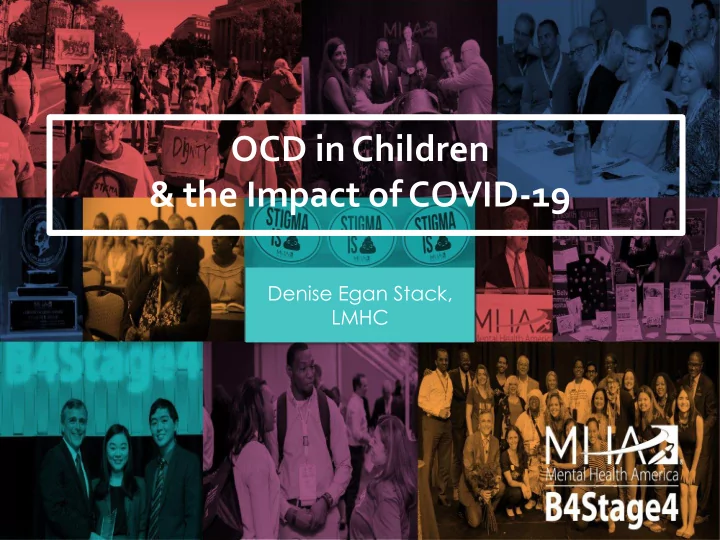

OCD in Children & the Impact of COVID-19 Denise Egan Stack, LMHC
OCD in Children & the Impact of Covid-19 Denise Egan Stack, LMHC
Normal Development • Common developmental phenomena in childhood. • Similar in form and content to OCD but different in frequency, intensity, and feared consequences.
Diagnostic Criteria • Obsessions: – persistently recurring thoughts, impulses or images that are intrusive, inappropriate, distressing. • Compulsions: – repetitive behaviors or mental acts that a person feels driven to perform to reduce distress or prevent a dreaded outcome. • Cause marked distress, are time consuming (>1hr/day), or cause significant interference in functioning.
• Fear of dirt, germs, or serious illness • Fear for personal safety Common or safety of parents • Feeling that things have Obsessions to be “just right” in Children • Disturbing and unwanted thoughts or images about hurting others
• Excessive washing • Touching or tapping • Excessive checking Common • Counting Compulsions • Repeating actions until in Children “just right” • Ordering or arranging • Confessing or apologizing
Epidemiology • 1 in 200 young people. • 1/2 of adults with OCD had onset prior to 15 years of age. • May occur early in life, early onset is more common in boys and in those with family history of OCD or tics. • Even with treatment there are often persistent functional difficulties.
Etiology • Brain differences • Immunologic: Pediatric Autoimmune Disorders Associated with Strep (PANDAS) or Pediatric Acute-Onset Neuropsychiatric Syndrome (PANS) • Genetic
OCD Clinical Presentation • Children with OCD vary with regard to: • Type of onset • Age at onset • Course of illness • Comorbid diagnoses • Content of obsessions and compulsions tend to change over time.
OCD & COVID-19 • Covid-19 does not cause OCD • Covid-19 may exacerbate OCD – Contamination – Fear of getting sick – Fear of causing harm to others – Perfectionism
OCD Accommodation: How Families Get Involved
Participate in ritualistic behavior • Wash hands with family member • Check that doors and windows are locked Assist in avoidance behavior • Won’t say certain words Examples of • Wont drive by cemeteries Facilitate symptomatic behavior Family • Buys excessive amounts of cleaning products for them Accommodation Modifying Family Routines • Can only eat outside the house • After school routine • Bathroom usage Take on Extra Responsibilities • Individual with OCD has no chores around the house Offer Excessive and repetitive reassurance • Will I be ok? • Are you mad at me? Modify Leisure Activities • Vacations • Socializing in the home Interference in Work Functioning • Repeated texts or calls at work Rage Attacks
Why Does Accommodation Persist? • In the short term, it works ☺ – Reduces OCD sufferer and loved one distress – Reduces family disruption • In the long term, it doesn’t work. OCD rituals persist and potentially worsen
Why It Doesn’t Work
Why Accommodation Doesn’t Work • Accommodating behaviors interfere with learning new information on the part of the OCD sufferer. • Family accommodation behaviors are usually done with resentment, hostility and criticism. • Accommodating the family member might be with the intention to “ keep the peace ” in the family or to alleviate one ’ s own guilt and anxiety. However, the solution is short lived as the anxiety returns and the need to accommodate arises again. • Client ’ s with OCD report that the accommodating behaviors are usually not that helpful anyway.
THE VICIOUS CYCLE OF AVOIDANCE PANIC PEAK A Compulsions N (Escape) X I Anxiety E quickly dropping T Y MASTERY Failure to Return of habituate obsessions OF OCD Begin TIME Wagner, 2002, 2005a Exposure
What To Do Instead
What To Do Instead • Make supportive and encouraging statements without accommodating can be helpful. • Direct your anger and frustration at the illness rather than the person. • Practice tolerating your own feelings in response to your family member’s distress. • More involvement isn’t always better. • Praise small gains • Reinforce behavior you want more of • Ignore behavior you don’t want • Try to avoid nagging snd blaming
What To Do Instead The Family Contract: make explicit agreements with your family member through calm discussion and negotiations. • The Situation • The Problem • The Goal • The Plan • The Contract • The Review • The Reward www.beyondocd.org
What To Do Instead • Reduce your involvement in rituals/compulsive behavior. • Limit reassurance (answering repetitive questions you’ve already answered). • Give praise for small gains. Recognize and highlight improvements you’ve noticed. • Encourage your family member to begin picking up chores and tasks around the house. • Remember that relapses can be part of getting better.
Tips for Parents: Covid Exacerbation • Be aware that times of high stress might mean an increase in or changing of your child’s OCD symptoms. • A setback or relapse is normal. • Talk to your child about how the general public health guidelines will work with their treatment plan. • Be mindful that not all COVID related questions are reassurance. • If your child is obsessing about an uncertain future, then engage in activities to keep your child in the present moment. • Consult with child’s treatment provider. • Limit exposure to media discussing coronavirus. • Stick to routines, especially if remote-learning. • Manage your own anxiety. • Self care IOCDF.org
• To refer or not to refer? • If distressing or interfering and cannot be managed at Referring school or home Children for • When to refer? • The longer a problem goes on the harder it may be to Treatment treat
Therapy That WORKS for OCD • Exposure & Response Prevention (ERP) – Part of Cognitive Behavorial Therapy (CBT) • Acceptance & Commitment Therapy • Eli Lebowitz ’ SPACE Treatment
THANK YOU!
Recommend
More recommend